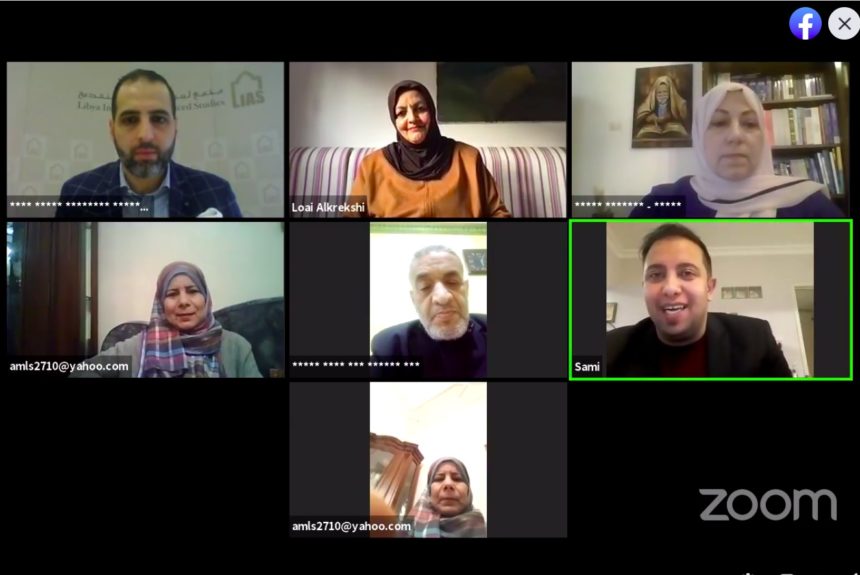The Libya Institute for Advanced Studies organized a discussion panel entitled: Children’s Literature in Libya, on the Zoom platform, on April 2, 2021, on the occasion of International Children’s Book Day, with the participation of a group of ladies and gentlemen interested in children’s books, moderated by Professor Sami Al-Jawadi.
And an attempt to review a group of important topics, questions and problems about: works directed to children, such as stories, dictionaries, books, and drawings, and evaluate them.
The duties of school libraries, public libraries, local publishing houses, and public and private school curricula.
The challenges related to contemporary technology, and ways to benefit from it to advance children’s literature and present it in modern and desirable ways.
Methods of improving children’s language and creative written and rhetorical production, and the roles assigned to governmental and private institutions in this regard.
Providing competitive proposals related to reading, reading, and training in story writing, while taking proper care of people with disabilities.
With the need to raise children’s awareness of contemporary issues and developments, issues of homeland, belonging, identity and literature, to reject violence, and to alert and train them to protect them from any harm or harassment they may be exposed to.
Dr. participated. Asmaa Al-Usta, a specialized professor, writer, and former Minister of State for Women’s Affairs and Community Development,
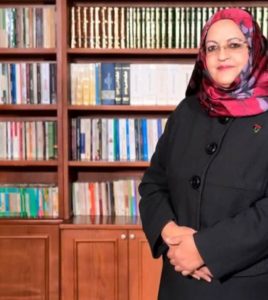 Dr. Asmaa Al-Usta
Dr. Asmaa Al-Usta
Among her books: The Intellectual Production of Children in Libya from 1921 to 2007. She talked about: The importance of building generations through books and through culture.
She explained the motives for writing her bibliographic book: The Intellectual Production of Children in Libya from 1921 to 2007, which included 909 titles.
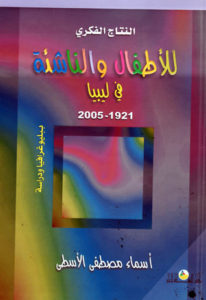
Starting with her father’s book, which contains poems addressed to children, by Professor Jamal Al-Din Al-Miladi [born in 1881 AD and died in 1963 AD], and through her interest in her children and acquiring appropriate books and stories for them.

Professor Jamal Al-Din Al-Miladi, May God have mercy on him
She referred to the author Muhammad Abdullah Al-Zakra [died 1998 AD] and his books aimed at children.
I was exposed to the most prolific writer, Professor Youssef Muhammad Al-Amin Al-Sharif, may God Almighty protect him [born in 1938 AD]. The number of his titles is more than half of the titles presented to children in Libya, and he has varied in his directions between translated stories, literature, theater, studies, dictionaries, encyclopedias, series, and children’s stories with Libyan heroes. With Libyan names.
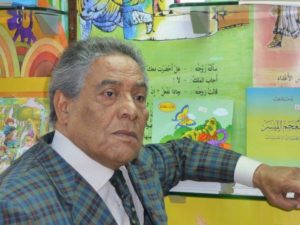
The literary professor Youssef Al-Sharif, may God protect him
Dr. suggested. Asma Al-Usta wanted an institution, school, or street to be named after Professor Youssef, as a reward for his distinguished efforts, and for him to witness this celebration with us.
It tried to raise an important question: What do we have regarding children’s literature and where is production concentrated?
Most of the production is stories, and there is a terrible shortage of religious books, and there is a shortage of biographies of Libyan figures, and what was published was by non-Libyan pens.
She indicated that his bibliography includes Libyan and non-Libyan writers, because she stipulated that it collect everything that is directed to Libyan children and published in its publishing houses.
He noted the important role of the textbook, because the educational curricula of the 1950s included literary works presented to students as creative parallel programs.
She reminded of the necessity of distinguishing between children’s literature and culture, and that culture is the most general and most important.
She indicated that the most important publishing institutions are: the General Company for Publishing, Distribution and Advertising, and the Arab Book House, a joint publishing institution between Libya and Tunisia, which began together in 1975, and which is late compared to the houses in neighboring countries.
It raised some problems in literature directed at Libyan children, including: the absence of women writing for children, the fact that translations are limited to some books, the fact that most publications have been sold out of the market for decades, the necessity of reprinting them, even electronically, the absence of electronic publishing, the high cost of paper books, the delay and lack of keeping up. In the creative drawings presented to the child, the delay in creating a website for the child, the absence of school activity from educational plans, the absence of the role of the public library, and the lack of the role of the school library devoid of continuous supply, magazines also have an important role, but they are short-lived, their cost is high, and the writer does not commit to Financial rights are not incentives.
She pointed out the necessity of formulating a Libyan character for children through which we can deliver educational and awareness messages to the child, and the necessity of providing tools and knowledge to the child before competitions, because how can we expect creative writing from a child who does not read and does not have a library?!
The category of children with disabilities has not been issued special publications for them throughout these years, even though international organizations provide access to audiobooks for these groups.
Over the past ten years, children’s publishing has only increased slightly from small books and collections of poetry and stories
The need to pay attention to electronic publishing, and the need to use modern tools related to technology and the electronic book.
Consider the production’s shortcomings, and focus on the stories of characters of national creative value, because the new generation lacks role models.
I pointed out the legislative flaw in Libyan law, whereby a child was considered from birth to the age of 16, and 18 was considered the legal age. Here, children of the ages of 16 and 17 were lost, and their rights were lost! Legal amendment is necessary.
She alerted to the presence of misleading and intellectually deviant books currently available in the Libyan market and libraries without censorship, and the necessity of having a team of specialists and trustworthy people to approve the book and scrutinize it in all aspects.
It recommended the necessity of having channels and websites with a purposeful message and a project adopted by official bodies, and the necessity of having a creative national plan directed to children.
She pointed out that translation is not always in our interest. Many stories do not suit us and do not agree with our concepts, because they have a different religious background and societal culture.
We should have our own identity by creating a Libyan cartoon character, a boy or a girl, to play awareness and creative roles, highlighting the necessity of the presence of black children, people with disabilities, family problems and ways to deal with and solve them in children’s stories, and introducing cultural components and employing them in creative cartoon stories.
It is necessary to make Saturday, by decision of education, a day for public activity and the library, so that the school is active, child-friendly, entertaining, and enjoyable, especially during holidays, and not a miserable institution and a hateful prison.
In order to raise the children of today, the men and women of tomorrow, we must reconsider, think, work, and continue planning.
She concluded by offering a unique, creative gift by saying: I want to donate all the Libyan books I collected about children and their literature, which are 450 titles, to make it a tool available to all researchers, and it contains rare publications, especially since we do not keep copies. She hopes to find an institution that will adopt this, so that a museum can be opened with these books. Always for the Libyan child book.
Ms. Nadia Youssef Al-Azabi, an inspector in the Ministry of Education, a master’s degree in librarianship, a trainer and activist in libraries, head of school libraries in the Educational Inspection Department, and a member of the Libyan Association for Libraries, Information and Archives, spoke.
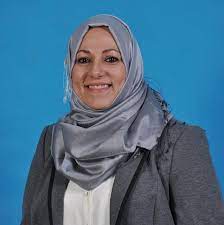
A. Nadia Al-Azabi
She talked about the impact of the school book and school libraries on children, and said that in her organization and its teams, she sought over 16 years to revive the role of the school library because of our confidence and knowledge that the role of the book is very important in enriching the child’s culture and building the personality, but unfortunately there were many obstacles. We have positions. With the management of curricula, school activities, and successive ministries since 2011.
The school library share was included through cooperation in the Ministry and the formation of a supply committee at the level of Libya. We chose a group of titles as a start to distribute them to libraries, but after effort in selecting the titles, this program was stopped and the books were not purchased on the pretext that the amount was large, and exhibitions were stopped, and various problems, and things changed. The ministries had bad results, and an agreement was made between the Ministry of Culture and Education to supply 50 libraries, but it was not fulfilled.
In one of the ministries, the library quota was cancelled, with the pretext of stopping it being the lack of specialists to operate these libraries, and the libraries were dismantled.
The library class is not required for its own sake, but rather what is required is to attract children to the library and get them accustomed to going there and learning about books.
The Ministry of Education and Culture called for the necessity of dealing with the advancement of school libraries, because through them we convey the child’s personality and culture, to create a conscious generation with a strong personality, and to provide them with receptacles of information.
It also appealed to the Educational Inspection Department and the Ministry of Education, which canceled and marginalized the activity materials, which are one of the methods of modern education.
Then, Professor Amal Al-Said Abu Aboud, member of the administration of the Libyan Association for Libraries, Information and Archives, and head of the activity committee commemorating World Children’s Book Day at the association, intervened.
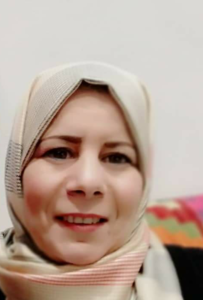
A. Amal Abu Abboud
She introduced the Libyan Association for Libraries and Information, which was founded in 2012 in Tripoli, and pointed out its activity on International Children’s Book Day, the diversity of this activity and the participation of children, the holding of competitions and reading stories, in addition to establishing mini-libraries in the oncology hospital, care homes and others, and conducting various workshops, And a small story competition entitled: My first story.
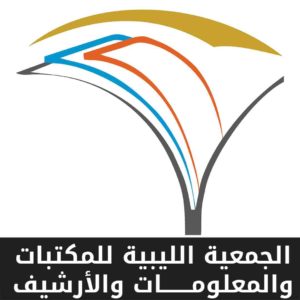
She hopes that the association will be supported to conduct various competitions and activities in the future.
The intervention was made by Ms. Mufida Al-Masry, Executive Director of the Intlaq Organization for Sustainable Development of Child Rights, and Engineer at the Educational Facilities Department, Laboratories Department.
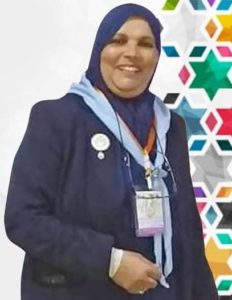
Ms. Moufida Al-Masry
The professor spoke about the Intilaq organization, whose slogan is to introduce children’s rights and activate children’s rights, including reading and its activities, awareness and education, and that it is based on a national project to activate the school library and school activity.
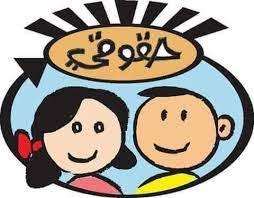
She carried out the “My Tomorrow Reads” campaign project at the Khadija Al-Jahmi Library, by creating motivational games that train the child to formulate sentences.
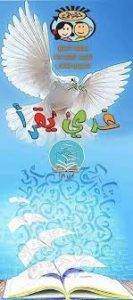
The organization has also developed a plan to establish a library project specifically for children in all aspects, and hopes that the project will be reviewed and developed, and that efforts will be made to support and establish it.
The intervention was made by Professor Sami Al-Jawadi, President of the Nour Al-Hayat Association, and author of books on children and their rights.

Mr. Sami Al-Jawadi
To introduce his creative awareness project that he carried out at the Nour al-Hayat Association, where he wrote a collection of books and stories and turned them into animated videos. He undertook several projects in cooperation with the Ministry of Education, the Activity Department, and UNICEF, training activists, teachers, and children, and distributing awareness books to them.
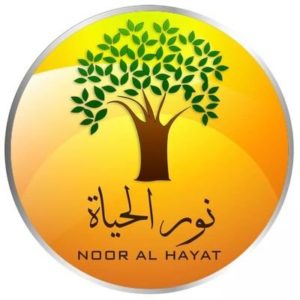
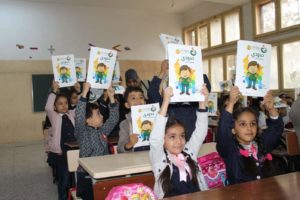
From his books:
The book, “Don’t Touch Me, My Body Is My Own,” is a book that talks about protecting children from sexual harassment. It is directed to children from the third grade of primary school to middle school.
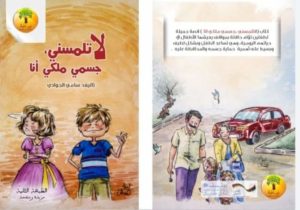
And a border book, directed to children as young as the fourth year, and it includes drawings and coloring, to protect against harassment as well.
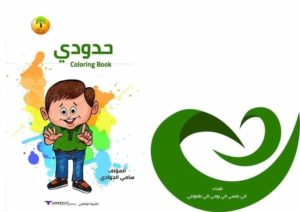
The book: Protection, which is directed to families as awareness messages to protect children from wars, conflicts and abuse of all kinds, and how to deal with problems and violations.
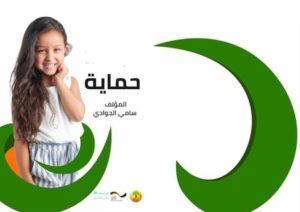
The book: A Child, a Guardian of My Rights, is a short story that teaches the child his rights, which he must obtain and defend.
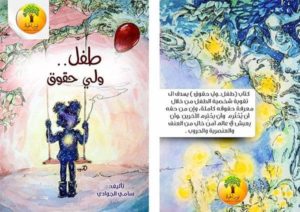
Professor Sami concluded his intervention with an appeal to the government and all specialists: that the Libyan child lags behind all the children of the world in the field of reading and children’s literature, and the state and community institutions must move intensively and multiply to catch up on what has passed and work collectively and creatively in order to advance Libyan children’s literature.
Professor Maryam Muhammad Al-Manfi, a faculty member at the Faculty of Education, University of Benghazi, Department of Education and Kindergarten, also participated.
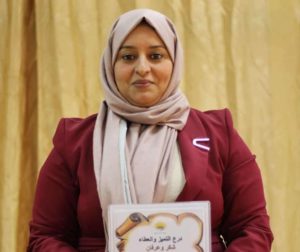
She spoke about the importance of the paper story in light of the tremendous technological development, and the necessity of paying attention to cultural dialogue for kindergarten children, because the beginning from childhood is to instill values through comic stories, tales, and novels.
The child at home was busy with the television, the iPad, and the phone, and we should compensate for this in kindergarten and at home with direct stories.
The need for kindergartens to be creative entertainment institutions other than traditional educational institutions.
She concluded by saying: I hope that everyone who works in children’s literature will include the first four-year stage and pay attention to it, and the necessity of localizing the library in all kindergartens.


